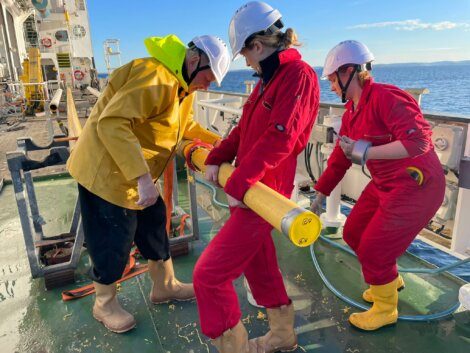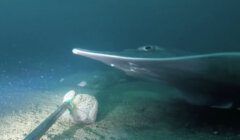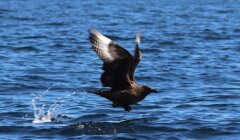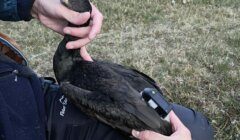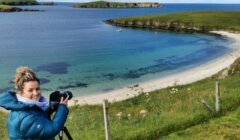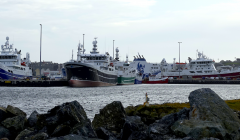Marine / Marine ecosystem researchers gather data off Shetland
A RESEARCH vessel which is being used for a project exploring ocean conservation and the marine ecosystem has been busy in waters off Shetland.
The RRS Discovery recovered sediment cores and recording data from the Fetlar and St Magnus basins.
The also gathered data and examples around Orkney.
It is part of the SEACHANGE project, which is led by an international array of universities.
The ship had arrived in Orkney and Shetland following passage from Southampton to the Skagerrak, then across the Witch Ground and Fladen Ground in the North Sea.
The ship is now headed to Iceland to continue work on the north coast before the expedition ends on 13 May in Reykjavik.
The project team said researchers do not currently know what the oceans were like before major impacts caused by humans.
They aim to find out, however, using sediments, shells and bones, and a host of “cutting-edge analysis technique”.
The project is jointly led by universities of Exeter, York, Copenhagen and Johannes Gutenberg in Mainz, Germany.
Along with partners at the universities of Queensland and Bergen, the project will discover how depleted the current marine environment is, what measures are needed to help biodiversity to recover and how long this might take.
The project was awarded a European Research Council Synergy Grant of 11.75 million euros (£10.5 million) in 2019.
The team have discovered that some clams live hundreds of years, including the longest-lived animal known to science, the Icelandic clam (sometimes called the ocean quahog).
These clams live in the waters around Shetland and Orkney.
Because their shells grow like tree-rings, with a layer each year, the scientists are able to decode these patterns from multiple naturally dead shells to reconstruct how the ocean has changed over hundreds to thousands of years.
Combined with novel analysis of seabed sediment DNA and geochemistry, the team will also be able to assess pre-human biodiversity and the way the marine ecosystem used to function just before human impact.
Become a member of Shetland News
Professor James Scourse, of the University of Exeter, said: “We will be able to reconstruct the full richness and diversity of the oceans immediately before they were impacted by significant human activity, for instance before Iceland was settled or there was significant whaling in Antarctica.
“This will provide a basis for assessing whether regions that we regard now as pristine, or not impacted significantly, are actually degraded remnants of a formerly much more diverse ecosystem.”
The University of Exeter’s Professor Callum Roberts added: “In developing detailed, dated time-series of ocean ecosystem change, we expect to be able to detect the earliest signs of human influence on the sea.
“And by understanding how the seas of today are different from the past, we will be able to better manage them for the future.”
Become a member of Shetland News
Shetland News is asking its many readers to consider paying for membership to get additional features and services: -
- Remove non-local ads;
- Bookmark posts to read later;
- Exclusive curated weekly newsletter;
- Hide membership messages;
- Comments open for discussion.
If you appreciate what we do and feel strongly about impartial local journalism, then please become a member of Shetland News by either making a single payment, or setting up a monthly, quarterly or yearly subscription.






